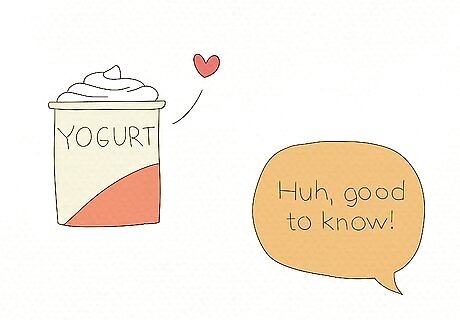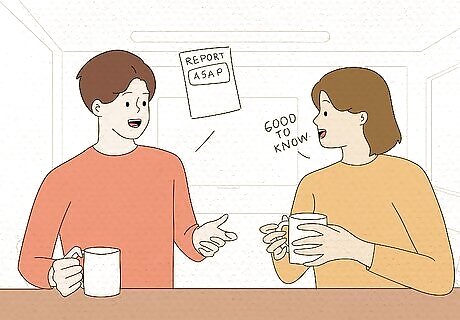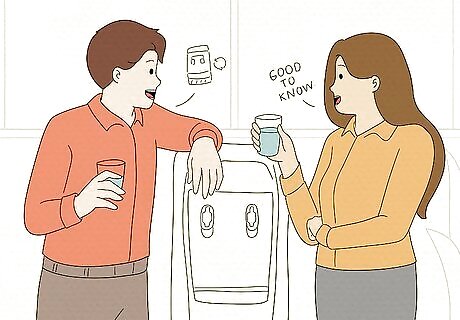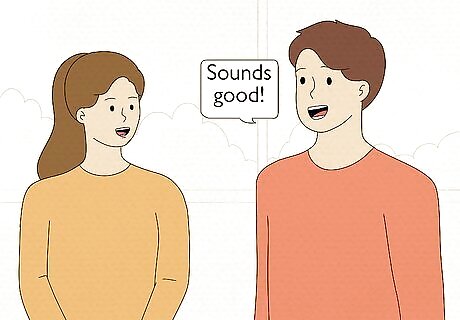
views
- “Good to know” is a common phrase that means you appreciate something helpful someone told you or made you aware of.
- Saying “That’s good to know” can be a polite way to acknowledge information if it’s something you already know or don’t find personally helpful.
- “Good to know” can be used sarcastically if someone told you something obvious or irrelevant to you.
“Good to know” Meanings

“Good to know” shows appreciation for learning something useful. When someone says “Good to know,” they’re letting you know that they’re thankful for something you told them or made them aware of. For example, you might've updated your friend when your plane lands or shared a cool fact about the movie you’re watching—whatever you told them was helpful, so they’re grateful. You: “FYI my plane is landing at 4 instead of 3 now.” Your friend: “Okay, good to know. I’ll be there to pick you up.” You: “Apparently this whole movie was filmed on a phone camera and won a lot of awards.” Your friend: “Oh cool, good to know!” You: “I heard Ms. Thompson is collecting our homework on Monday.” Your friend: “Good to know. I guess I’ve got some work to do now.”

“Good to know” can be a polite way to simply acknowledge information. Sometimes, “Good to know” is just a neutral response to something you said. The person you’re talking to might not find the information you shared particularly helpful or unhelpful, or they don’t know what else to say. In this case, their “Good to know” might sound indifferent instead of appreciative or enthusiastic. You: “I really love this yogurt because it has a lot of protein.” Your friend: “Huh, good to know.” You: “My relatives are over in Italy right now, it looks like they’re having a fun time.” Your friend: “That’s good to know.” You: “I’m always cold, so I’d bring a jacket to the restaurant.” Your friend: “I don’t typically run cold, but good to know.”

If the information isn’t useful, “Good to know” can be sarcastic. In some cases, “Good to know” means the exact opposite—the information you shared is useless or irrelevant to the person you’re talking to. For instance, your friend might not care about the latest breakup on a reality TV show or find your warning that it’s about to rain obvious. Just look for signs that they’re being sarcastic, like emphasized language, exaggerated enthusiasm, or rolling their eyes. You: “OMG that couple I was rooting for on Love Island broke up. Apparently, they weren’t on the same page.” Your friend: “No way! That’s so good to know.” You: “Hey, I just checked the forecast and it’s supposed to storm in a few minutes.” Your friend: “Wow, good to know. I couldn’t tell due to all that thunder in the distance.” You: “Don’t forget to put the milk back in the fridge, it’ll spoil if you keep it out.” Your friend: “Really?! Good to know.”
How to Use “Good to know”

Give thanks for being made aware of something with “Good to know.” When a friend, classmate, or coworker tells you something you didn’t know, say, “That’s good to know!” This shows them that you’re grateful for the information or heads-up and appreciate them looking out for you. Your coworker: “I’d put that report together ASAP, the CEO is coming in on Friday.” You: “Oh, good to know. I’ll get right on that.” Your friend: “I stayed in the center of the city and thought it was a great way to see everything.” You: “That’s good to know. I’ll look and see what hotels are nearby.” “That’s good to know” is a more casual phrase, so use it with friends, family members, and colleagues you have a close relationship with. Stick to saying, “Thank you,” or “I appreciate the information” when a teacher, manager, or boss tells you something useful.

Politely acknowledge something someone said with “Good to know.” If you’re not sure how to respond to your friend’s random dolphin fact or your coworker’s rant about the office vending machine, simply say, “Good to know.” This is a friendly way to show that you heard what they’re saying, even if you’re not thrilled by the conversation. Your friend: “Today I learned that some dolphins can hold their breath for up to 15 minutes.” You: “Huh, good to know.” Your coworker: “They’re changing out the snacks in the vending machine and replacing them with way worse ones.” You: “Oh, that’s good to know.”

Say “Good to know” sarcastically when something is irrelevant to you. If your friend said something totally obvious or shared something you find silly, gently tease them with a sarcastic, “Good to know.” Let them know you’re joking and being sarcastic by exaggerating your appreciation. Your friend: “Don’t sit in that seat, it’s completely soaked.” You: Really? Good to know. That wasn’t clear from you yelling, ‘It’s wet!!’” Your friend: “Wow, my mind’s blown. I didn’t know that cows can’t walk down stairs.” You: “Woah, that’s so good to know. You’re always telling me the coolest things.”
Responding to “Good to know”

Say, “You’re welcome.” When someone says, “Good to know,” after you tell them something, let them know that you’re glad to help them out. There are lots of ways to say this, like, “No problem,” “You’re welcome,” “Anytime,” or “Of course!” Your classmate: “That’s good to know about the due date change.” You: “No problem!” Your friend: “Oh, good to know. I’ll listen to that podcast on my way home.” You: “Anytime! I love giving recommendations.”

Answer any questions they might have about what you said. After a friend, coworker, or acquaintance tells you, “Good to know,” they might have follow-up questions about what you shared. For example, if you told your roommate that the trash isn’t getting picked up tomorrow like normal, they might want to know why and when the next pick-up date is. Your friend: “That’s good to know about the trash. When are they rescheduling pick-up for?” You: “They should be coming by sometime next week.” Your coworker: “Good to know that it’s not just my internet that’s down. Has anyone reached out to IT?” You: “Yes, I called and they should get us back online within the next hour.”

Respond to their sarcasm with sarcasm of your own. If someone replies to you with a sarcastic, “Good to know,” respond with a teasing reply. For instance, you might joke about what you said or cheerfully say that you’re happy to help. Your friend: “Woooow that’s so good to know! Who knew you had to turn the Wi-Fi on to access the internet.” You: “Look, we can’t all be technological geniuses.” Your friend: “Good to know that the boiling water will in fact burn me! I don’t know what I’d do without you.” You: “I just knew you’d enjoy that fun fact!!”
Other Ways to Say “Good to know”

“Sounds good,” “Great to hear,” or “Perfect” have similar meanings. If you’re saying, “Good to know” a lot and want to switch up your vocabulary, use these phrases that also express your appreciation for learning something: “Sounds good.” “Great to hear.” “That’s useful to know.” “Nice to know.” “Perfect.” “Awesome.”



















Comments
0 comment